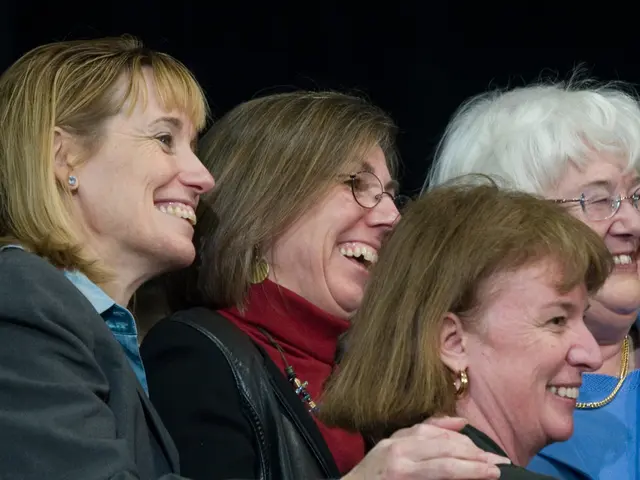Menopause Unveiled: Why It's Still a Hush-Hush Topic
Struggles in Discussing Menopause: Women Frequently Face Challenges Expressing Experiences - Struggles in Discussion: Women Report Difficulty in Discussing Menopause
Maybe it's the sweat trickling down her face or the flushed complexion, but Sybille Müller, a 47-year-old German woman, can't seem to escape the heat waves haunting her for years - hot flashes, that is. Menopause has become her unwelcome companion, and yet, it's a topic many women would rather not discuss.
Müller is one of millions of women grappling with menopause's nuisances, from mood swings to sleep disturbances and everything in between. According to Thomas Strowitzki of Heidelberg University Hospital, approximately 30% of menopausal women experience mild symptoms, while a staggering 50% carry the burden of more severe issues.
A Taboo Shrouded in Age and Aging
Why the hushed tones? "I hear from women that they find it difficult to talk about it," says Mandy Mangler, chief physician at two Vivantes Auguste-Viktoria clinics in Berlin. "It's still very taboo because it's also about aging, about doors closing," she adds.
The cessation of menstruation, a first point of no return in life, marks the beginning of menopause. Fertility is now a distant memory, a truth inextricably linked with aging. Aging, unfortunately, is a subject fraught with criticism in our society, compounded by the entrenched attitude among women: "Don't make a fuss, don't put yourself in the foreground" - don't whine about pain and problems.
Breaking the Silence: De-Tabooizing Menopause
But change is in the air. Women are becoming more confident in their own skin, pushing back against societal norms. "If you will, it might be part of a feminist consciousness," says Katrin Schaudig, president of the German Menopause Society. It's also an issue of gender equality, as efforts to bridge the pay gap between men and women gain traction.
By the numbers, nine million women in Germany are now in this chapter of their lives. Schaudig advocates, "These menopausal women should be acknowledged and taken seriously."
In the commercial world, businesses are starting to offer counseling on menopause, recognizing the importance of addressing women's health concerns. Companies are also taking note. Strowitzki observes, "We're seeing more efforts by companies to understand and cater to the needs of affected women." Heidelberg University Hospital, for one, has formed working groups to design the workplace to accommodate women dealing with menopausal symptoms and maintain productivity.
Plant-based alternatives and lifestyle adjustments can also contribute to alleviating menopausal symptoms, according to experts. Regular exercise, healthy eating, and Kneipp applications can help combat hot flashes, and plant-based products like grapefruit extract, red clover, and soy may provide additional relief.
However, hormone replacement therapy may still be necessary for some women, and the benefits and risks must be weighed carefully. Prolonged hormone replacement therapy has been linked to an increased risk of breast cancer, as per the German Cancer Society. But hormones can also stabilize bones, and it's always about striking the right balance - the woman's burden.
Despite the challenges, there's a silver lining to menopause. Müller echoes the sentiments of many women when she says, "When you bring up the topic, suddenly four more people chime in with 'Me too' and 'I'm taking this', and suddenly it's a huge topic."
Menopause marks a transition, not an end. Mangler emphasizes its positive aspects, such as the freedom from the worry of contraception and menstrual discomfort. "Women in this phase tend to stop doing things they used to do out of more or less goodwill - because they wanted to please someone." Instead, they may choose to live their sexuality as they wish.
The 48-year-old Mangler hopes for a future where the handling of the female cycle normalizes, regardless of life phase. "We won't devalue women just because they're aging and entering this phase. Instead, we'll recognize their potential and strength."
- In the realm of women's health and wellness, the German Menopause Society, led by Katrin Schaudig, is advocating for an increase in awareness and de-stigmatization of menopause, viewing it as part of a broader feminist consciousness and gender equality movement.
- As businesses and companies continue to prioritize health and wellness, there is a growing recognition of the need for vocational training programs tailored to addressing the unique challenges faced by menopausal women in the workforce, ensuring a healthier and more productive work environment.








